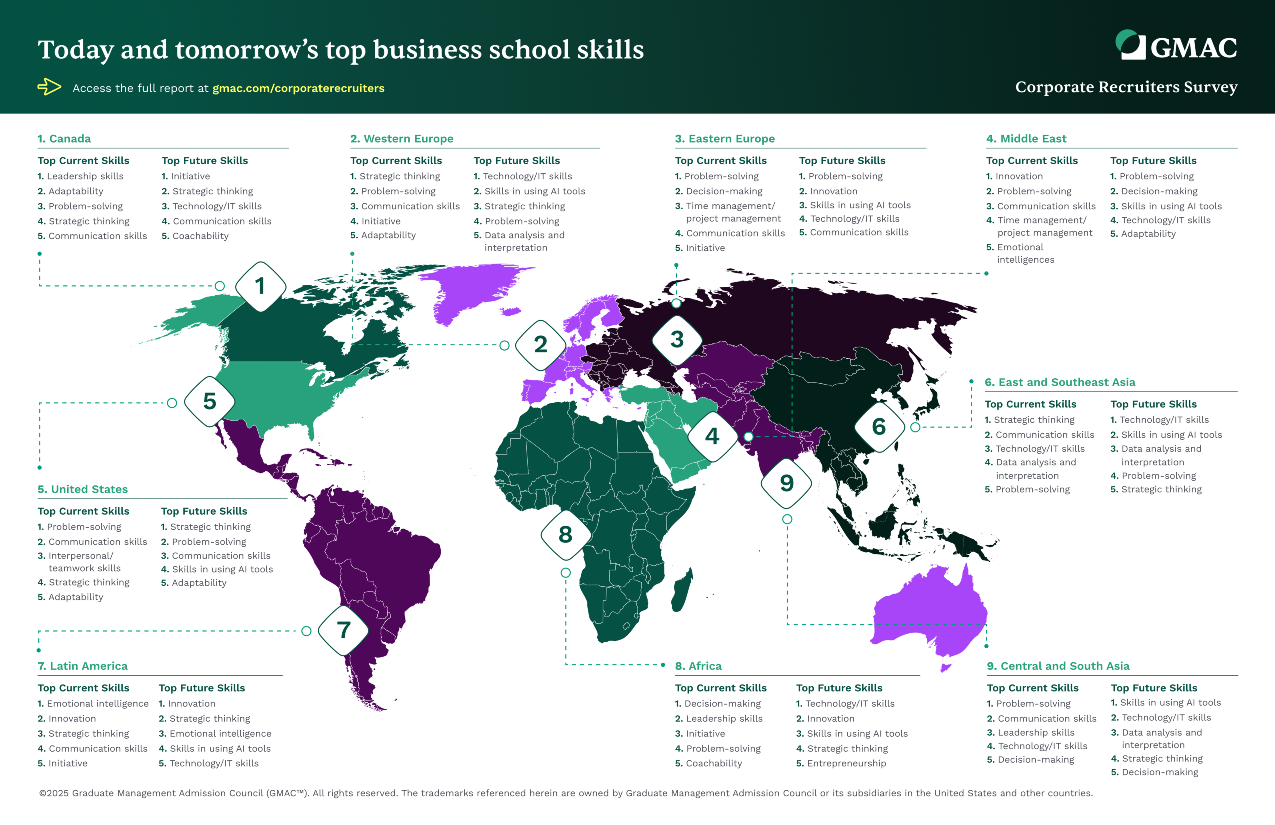A new global report has highlighted the continued strong demand for MBA graduates, with artificial intelligence (AI), strategic thinking, and business ethics topping the skills wish list of recruiters and hiring managers in 2025.
The Graduate Management Admission Council (GMAC) annual Corporate Recruiters Survey, based on insights from more than 1,100 corporate recruiters and staffing firms around the world, offers valuable intelligence for anyone considering graduate management education (GME), such as an MBA or business master’s degree.
READ MORE: Corporate Recruiters Expected To Hire More MBAs This Year (2024)
Most global recruiters agree that the strategic, analytical, and leadership skills taught in MBA programs are even more critical today—especially in hybrid and remote work environments. Looking ahead five years, skills related to AI and emerging technologies are expected to take centre stage, suggesting that tech-savvy business graduates will be in high demand.
GMAC CEO Joy Jones said the survey reaffirms employers’ trust in graduate management education’s ability to develop leaders who can navigate complexity and drive innovation.
“As AI reshapes work and hybrid workplaces become more common, this confidence reflects graduates’ ability to adapt and lead through uncertainty, signaling that business schools remain essential partners in developing the skillsets and mindsets organisations need,” she said.
“With this strong foundation of trust, employers, business schools, and their graduates can thrive through the transformational changes ahead.”

Key findings odf the survey include:
- Positive employer perceptions of business education: An overwhelming 99% of global employers express confidence in business schools’ ability to prepare graduates for success within their organizations. Moreover, nearly two-thirds affirm that the skills gained through a graduate business degree are more critical than ever, as companies increasingly adopt emerging tech.
- The enduring and rising importance of human skills in the modern workforce: more than half of global employers cite the value of communication skills in their hiring decisions, with employers also valuing candidates’ emotional intelligence and adaptability in their current and future hiring decisions.
- Growing employer confidence with increasing flexibility in work and study: 56% of global employers agree or strongly agree that the skills gained through a business degree are more important than before for businesses using remote or hybrid working arrangements; roughly the same percentage (55%) also agree or strongly agree that they value graduates of online or predominantly online and in-person programs equally.
- New “Gen Z” hires’ professionalism demystified—somewhat—by employers: 61% of corporate recruiters find recent GME graduates to demonstrate the same level of professionalism—such as reliability, respectfulness, or professional appearance—as graduates from previous years. However, roughly a quarter of the more client-facing consulting and health care/pharmaceutical recruiters disagree.
- Hiring projection spotlighting popularity of generalist business degrees: 76% of global employers predict that they will hire about the same or more newly minted MBA graduates in 2025 compared to 2024. In fact, 90% of them plan to hire talent with an MBA—even more than prospective employees with bachelor’s degrees or those coming directly from other organisations.
Interestingly, prospective MBA students are increasingly seeking hands-on AI experiences in the classroom, along with strong strategic thinking and ethical leadership content. The survey also found that concerns about school rankings are declining, while interest in ROI and real-world outcomes continues to grow.
The survey also showed that after a surge in interest during the pandemic, demand for hybrid and online MBA programs is cooling. More candidates are favouring traditional in-person learning, either full-time or part-time, to gain deeper engagement with faculty and peers.
The U.S. and Western Europe remain the top destinations for MBA study, although students in India and Greater China are increasingly considering high-quality programs at home. Consulting, finance, and technology continue to be the most desired industries post-graduation, despite a modest dip in interest in the tech sector.
Today’s students are relying more on financial aid and less on family support than they did before the pandemic, indicating a growing need for funding support and scholarship transparency.
This year’s findings reinforce the growing value of business education in a rapidly evolving global economy. For prospective students, the message is clear: investing in an MBA offers more than just a degree, t equips you with the tools to lead, adapt, and thrive in the future of work.
GMAC conducted this year’s survey, together with survey partners European Foundation for Management Development (EFMD) and the Career Services and Employer Alliance (CSEA), from January to March 2025.








